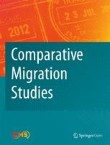This special issue explores the potential of an organisational perspective in and for migration studies. Organisations – such as public administrations, border agencies, schools, universities, companies etc. – actively shape migration trajectories and processes of inclusion/exclusion in multiple ways. However, an organisational approach has received relatively little attention in migration research, which has long concentrated either on the macro-level of migration and integration policies or on the micro-level of individual migration and incorporation outcomes, trajectories and agency. While we witness a growing number of studies examining different types of organisations lately, they are still rather compartmentalised and largely lack a systematic and comparative take on organisations.
This special issue places organisations at the center of analysis. The contributions progresses the study of organisations in the context of migration and incorporation by taking organisational approaches as an analytical perspective.
The special issue brings together contributions focusing on the role of organisations in both migration and incorporation processes as well as in sending, receiving and border contexts.
This broad range of empirical contexts is a conscious choice: by comparing organisations, social contexts, different forms of migration and modes of inclusion/exclusion we seek to shed light on overarching organisational practices, structures and rationalities at play.
The special issue addresses the following main questions:
- What role do organisations play in the production of migration movements and migrants’ inclusion?
- How do organisations mediate structural factors and individual actions and trajectories in migration and immigrant incorporation contexts?
- What do organisational studies offer for migration studies, which theoretical concepts and strands are helpful?
- How can case studies on specific types of organisations inform our understanding of the role of organisations more generally if we place them in a comparative perspective?
Edited by: Christine Lang, Andreas Pott and Kyoko Shinozaki
